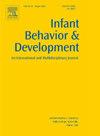Mothers’ and fathers’ emotion socialization: Longitudinal relations with toddlers’ social competence
IF 1.9
3区 心理学
Q3 PSYCHOLOGY, DEVELOPMENTAL
引用次数: 0
Abstract
We examined longitudinal direct associations between mothers’ and fathers’ emotion socialization behaviors (ESB) at 18 and 24 months and toddlers’ social competence (SC) at 24 and 30 months in a sample of ethnically diverse families (n = 128) participating in a parenting intervention study. We also investigated interaction effects between mothers’ and fathers’ ESBs and between each parent’s ESBs and child emotionality. We coded parents’ ESBs to their toddlers’ positive and negative emotions during no-toy play and a clean-up task. Mothers reported on their toddlers’ social competence and emotionality. Using multiple linear regression modeling, we report three findings. First, mothers’ and fathers’ most frequent ESBs were emotion coaching and ignoring to positive and negative emotions, respectively, but emotion coaching of positive emotions by either parent was not associated with children’s SC. Second, mothers’ and fathers’ ESBs to negative emotions, however, were associated with children’s SC, but these associations varied by child emotionality and the other parent’s ESBs. Third, fathers’ non-supportive ESBs to negative emotions at 18 months were directly and positively associated with greater SC at 30 months, but their emotion coaching was significantly and positively related to children’s SC only when mothers did not provide any emotion coaching. The association between mothers’ non-supportive ESBs to negative emotions at 24 months and 30-month SC was negative only for children high in emotionality. These findings show that both mothers’ and fathers’ ESBs shape their children’s social competence in different ways, which needs to be considered when developing programs for children.
父母情绪社会化与幼儿社会能力的纵向关系
我们在参与父母干预研究的不同种族家庭样本( = 128)中,研究了父母在18个月和24个月时的情感社会化行为(ESB)与幼儿在24个月和30个月时的社会能力(SC)之间的纵向直接关联。我们还研究了母亲和父亲的ESBs之间以及父母的ESBs与儿童情绪之间的相互作用效应。我们将父母的esb编码为孩子在无玩具玩耍和清理任务时的积极和消极情绪。母亲们报告了她们的幼儿的社交能力和情感。使用多元线性回归模型,我们报告了三个发现。首先,母亲和父亲最常见的ESBs分别是情绪指导和对积极情绪和消极情绪的忽视,但父母任何一方对积极情绪的情绪指导与儿童的SC无关。其次,母亲和父亲对消极情绪的ESBs与儿童的SC相关,但这些关联因儿童情绪和父母另一方的ESBs而异。第三,父亲在18个月时对负面情绪的非支持性esb与30个月时更高的SC直接正相关,但只有在母亲不提供任何情绪指导的情况下,他们的情绪指导与孩子的SC显著正相关。母亲在24月龄和30月龄时的非支持性脑电图与负性情绪的关系仅在高情绪儿童中呈负相关。这些发现表明,母亲和父亲的esb都以不同的方式塑造了孩子的社会能力,这在制定儿童计划时需要考虑到。
本文章由计算机程序翻译,如有差异,请以英文原文为准。
求助全文
约1分钟内获得全文
求助全文
来源期刊

Infant Behavior & Development
PSYCHOLOGY, DEVELOPMENTAL-
CiteScore
4.10
自引率
4.80%
发文量
94
期刊介绍:
Infant Behavior & Development publishes empirical (fundamental and clinical), theoretical, methodological and review papers. Brief reports dealing with behavioral development during infancy (up to 3 years) will also be considered. Papers of an inter- and multidisciplinary nature, for example neuroscience, non-linear dynamics and modelling approaches, are particularly encouraged. Areas covered by the journal include cognitive development, emotional development, perception, perception-action coupling, motor development and socialisation.
 求助内容:
求助内容: 应助结果提醒方式:
应助结果提醒方式:


